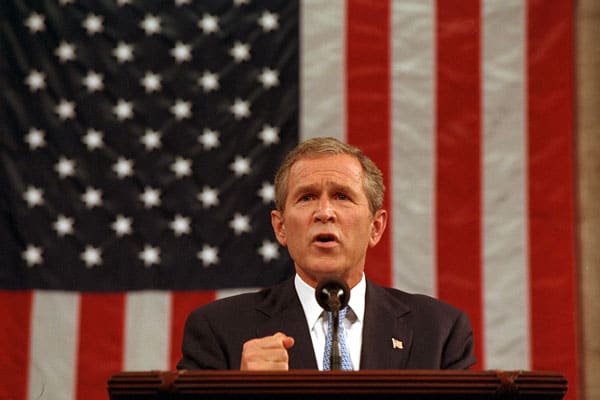This DeSmog UK epic history series post takes a closer look at ExxonMobil’s contribution to George W Bush’s election as President of the United States.
The 2000 US election cycle was as high stakes as they come. Congressional balance was in question, and the presidency was up for grabs.
The George W Bush–Dick Cheney partnership was Big Oil’s dream team. Bush, the presidential candidate, had made his early career though oil exploration in his home state of Texas, while Cheney, vice president (VP) candidate, was a Halliburton executive and ex-congressman of Wyoming, the US’s biggest coal producer.
Al Gore, the Democratic nominee for president, on the other hand, had been nothing short of a hate-figure for the sceptics and the oil industry, as VP under Clinton, so they knew which way their bread was buttered.
Republican Funding
More than 75 percent of the oil and gas industry’s direct spending on political candidates went to the Republicans that year.
And, with ExxonMobil, the divide was even starker: more than 95 percent of their $700,000 Political Action Committee spending went to the Republicans.
This is to say nothing of the numerous free market, climate sceptic think tanks funded by ExxonMobil and the Koch Brothers who donated to the Republican campaign. Individuals with a declared affiliation to ExxonMobil also gave a total $1.22 million in private donations to the Republicans between 2000 and 2008.
In total, Bush received $1.5 million from the oil industry for his 2000 presidential campaign. At the time, this was the largest donation from the industry to a single political candidate.
And so, on 20th January 2001, George W Bush was inaugurated as President of the United States, floating on oil money.
Exxon and the White House
A mere three weeks later, ‘Iron Ass’ Raymond of Exxon flew to Washington to meet with VP Dick Cheney in the West Wing. The two Midwesterners were old hunting friends who had met in the ‘80s when Cheney was congressman for Wyoming.
Their wives, Charlene Raymond and Lynne Cheney, were friends from the American Enterprise Institute for Public Policy Research. They came from the same free market background and, through the nineties, had lived in the same upper middle class leafy Victorian Preston Hollow in Dallas.
Raymond boasted that his access to the Bush administration was comparable to the halcyon years of the Reagan Presidency. Indeed, their private meetings became a regular feature, with two or three meetings scheduled every year through the administration.
ExxonMobil’s influence on the president reached as far as foreign policy. Shortly after Bush was elected, the oil giant’s approval was required for India’s largest state-owned oil company to buy into the Sakhalin-1 energy project in Russia.
When asked by Manmohan Singh, India’s Prime Minister, “why don’t you just tell them [Exxon] what to do?” Bush replied: “Nobody tells those guys what to do.”
Next up on the DeSmog UK epic history series, we look at how Big Oil helped push Bush to pull out of the Kyoto Protocol.
Photo: Eric Draper via Public Domain
Subscribe to our newsletter
Stay up to date with DeSmog news and alerts







